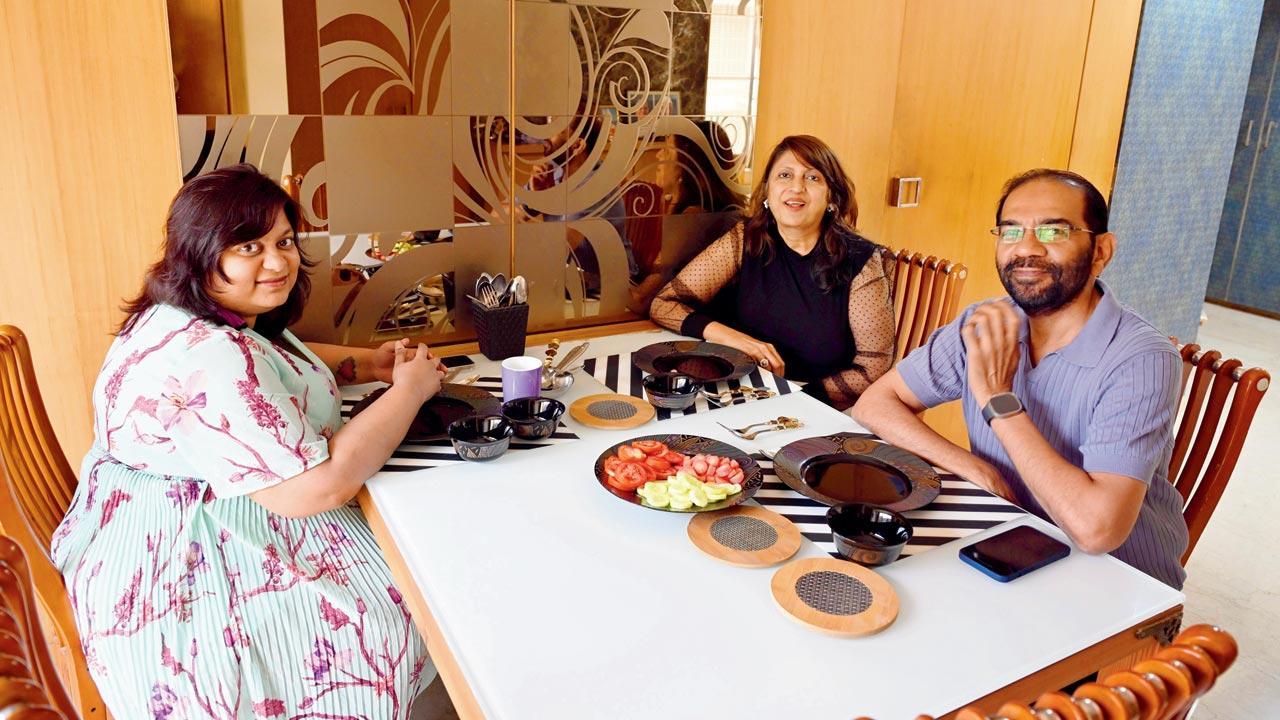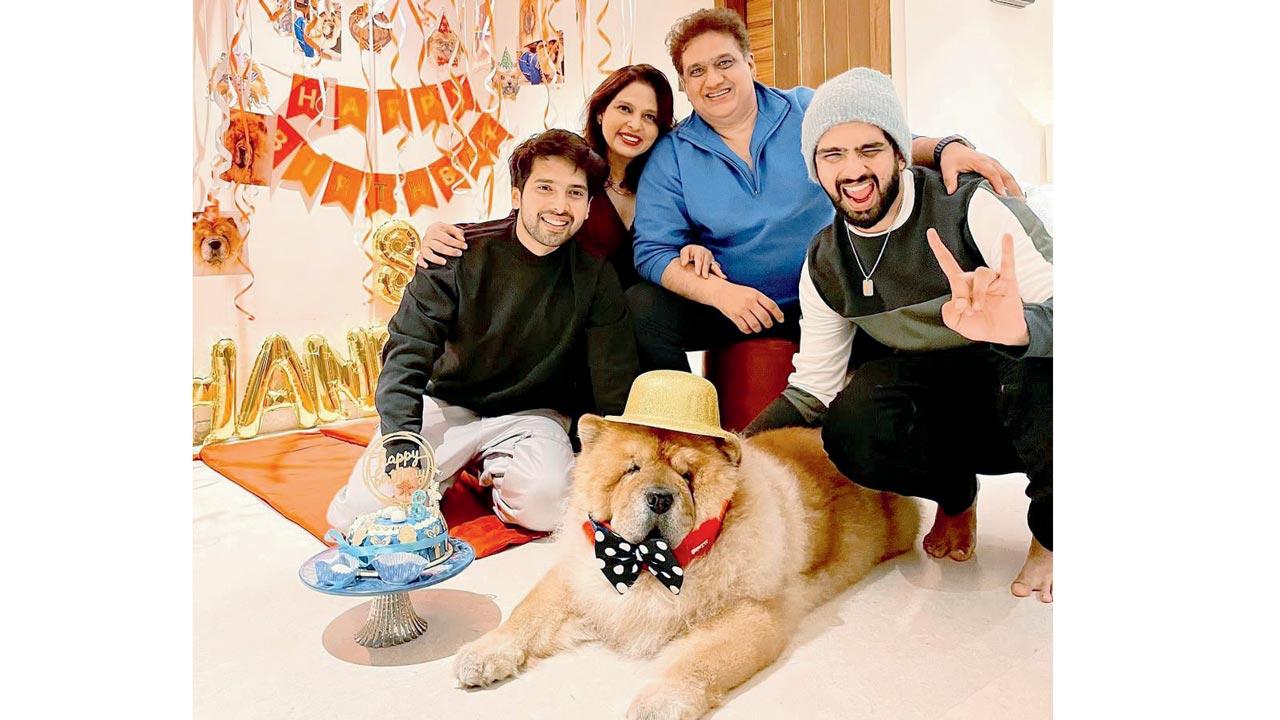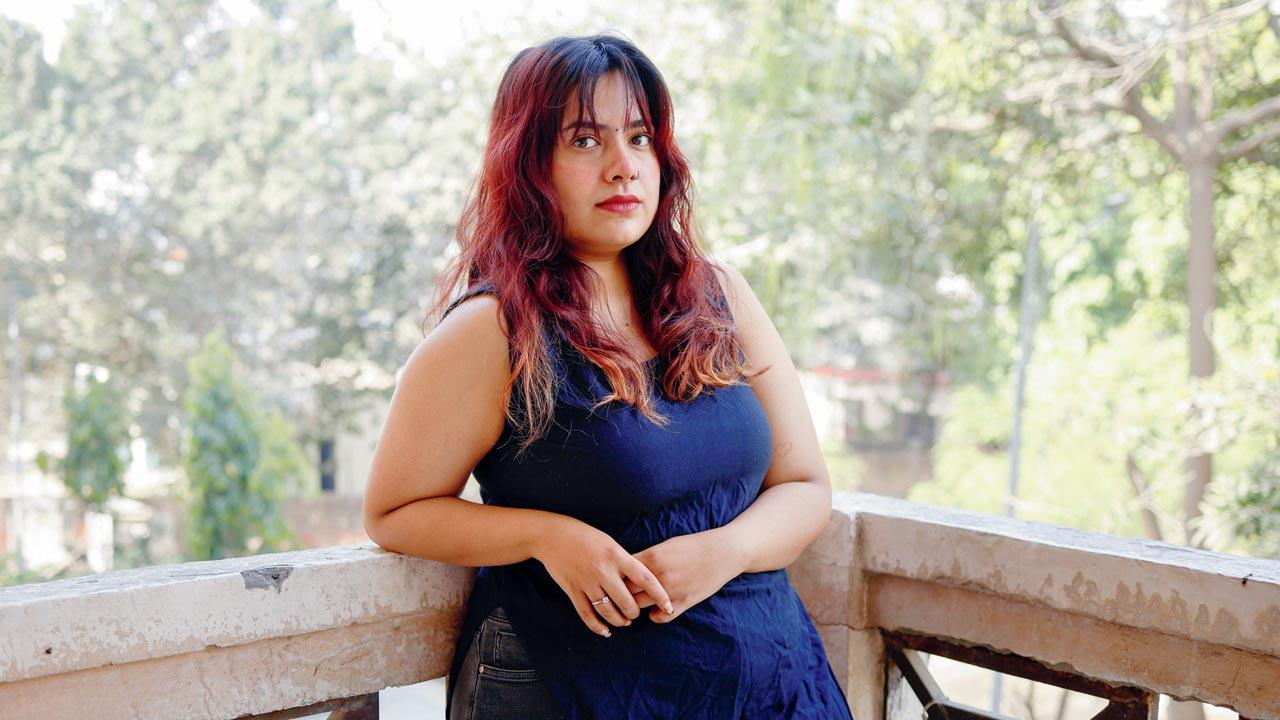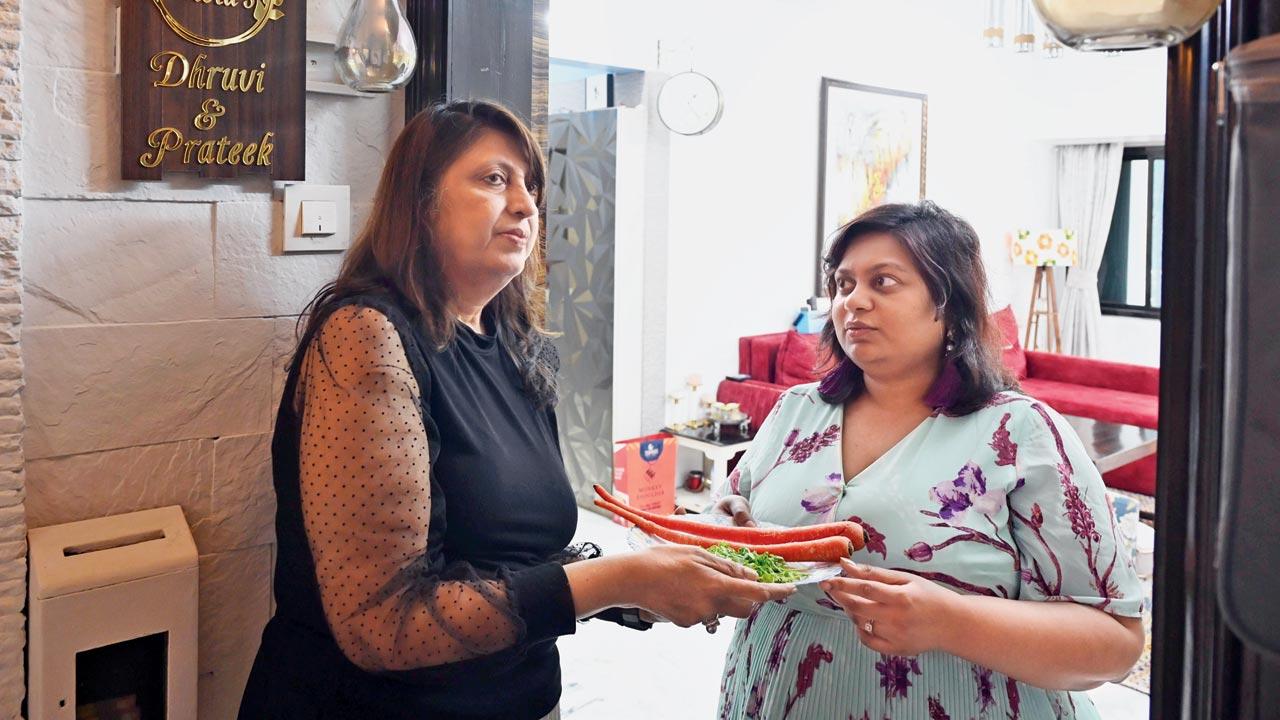In a first for Bollywood families, composer Amaal Mallik has publicly cut ties with his parents. And, he’s not the only one prioritising his mental health over the orthodox Indian values of parivaar and parampara

Dhruvi Shah Mota (left) and her husband live just one floor above her parents, aiming to strike a balance. Pic/Ashish Raje
This is a generation that has grown up on Bollywood films about “parivaar” and “parampara”; think Hum Aapke Hain Koun, Kabhi Khushi Kabhi Gham, Hum Saath Saath Hain, or Baghban, to mention just a few. On and on, it’s been drilled into us that family is above all, and we must do whatever it takes to keep it together, even at great personal compromise.
ADVERTISEMENT
From the Ambanis to the Bachchans, many of the wealthiest and most prominent families have never been known to speak out publicly about differences within the clan. So when Bollywood musician Amaal Mallik (nephew of famed music director Anu Malik) posted on social media that he had cut ties with his parents, his candour sent shockwaves across the film and music industry, as well as the country.
 Amaal Mallik in a now- deleted Instagram post
Amaal Mallik in a now- deleted Instagram post
Mallik blamed his parents for his “diminished self-worth” and strained ties with his brother and fellow musician Armaan. “Through the last many years, they have left no opportunity to disturb my well-being and belittle all my friendships, my relationships, my mindset, my self-confidence,” reads his now deleted post, which has since resurfaced on Reddit.
While there are a few netizens who criticised the 29-year-old composer for airing the family’s dirty laundry, a majority of fans have backed Mallik, sympathising over rumours that he was sidelined by the family in favour of his younger brother. One commenter on Reddit said, “Younger child will always be the parents’ favourite and the elder one is always asked to adjust and compromise from childhood itself.”
In a country where parents are seen as second only to god, it may be surprising to see this outpouring of support for Mallik. But this is also the generation that has pushed for personal freedom over all else, breaking with the tradition of the great Indian joint family. The National Family Health Survey 2019-21 shows that nuclear families now make up 58 per cent of households across the country.
Sociologist Dr Nilay Kumar, a visiting Senior Professor at Mumbai University, says family dynamics have changed greatly since the 1980s and ’90s. “Today’s youth prioritise personal ambitions, financial independence, and individual growth over family. Which is fair. Nuclear setups are more conducive towards this, as joint families bring other responsibilities, like looking after the elderly, children, or other general chores,” he says.
 (From right to left) Amaal Mallik with his father Daboo Malik, mother Jyothi and younger brother Armaan in happier times. Pic/Instagram @ArmaanMalllik
(From right to left) Amaal Mallik with his father Daboo Malik, mother Jyothi and younger brother Armaan in happier times. Pic/Instagram @ArmaanMalllik
It’s not always economics or lifestyle choices at play; for queer people who are not accepted by their parents, or those who suffer abuse (sexual, physical or emotional) within the family, going solo becomes the only option. It only causes them further damage when society then criticises them for “breaking the family” or “damaging its sanctity”.
“Prolonged childhood experiences of being completely dismissed or neglected, or where individual needs are not considered and healthy boundaries are not spoken about, hints of family environments that have already lost sanctity... If adults have a predominant experience of emotionally unhealthy family dynamics, then the likelihood of staying away is even more,” says Sharine Jacob, clinical psychologist and psychotherapist, adding, “The idea that parents or elders are always right is, in itself, problematic. Such values are stifling.”
This is one of the top reasons why many queer children end up moving out of their parental homes as soon as they are able to, says Dr Kumar. “In orthodox joint family setups, parents often prioritise social prestige and family honour over their child’s well-being. Confrontation in a joint family means societal judgment, so people avoid it,” he adds.
Despite the changing dynamics, traditional Indian joint families are unlikely to vanish entirely, the sociologist says. “They are evolving into hybrid models—sociologists call it ‘proximate-but-autonomous families’ or ‘sehchari parivaar’, where members and their spouses live separately yet nearby… They eat separately and manage individual finances, yet support each other in times of need,” adds Dr Kumar.
But a more radical change is emerging, he points out, particularly among urban youth who are increasingly rejecting familial institutions altogether. “They want absolute independence, no traditional bonds. They are ready to abandon family structures entirely. The coming decades will be fascinating to watch,” he says.
58%
Of total Indian households are nuclear families
Source: National Family Health Survey 2019-21
‘There’s a cultural fixation with keeping the family together no matter what’
Manju Mehta, 30,
Family structure: Formerly lived in a joint family
Where in Mumbai can you find a house big enough for a family of 13? Nowhere, it turns out. Which is why Manju Mehta’s (name changed) family bought three flats in Borivli and combined them to create a sprawling 9-Bhk house—unheard of this city. And yet, with so many different personalities under one roof, they still stepped on each other’s toes from time to time.
 Representational pic/iStock
Representational pic/iStock
The household comprised her parents, brother, grandparents and the families of her dad’s two older brothers (including their wives and two children each). “As a kid, it was pretty great growing up surrounded by my cousins. I was never lonely. But as we got older, sharing my room meant that I rarely had a moment to myself. I’d end up staying up till 3 am just for some peace,” recalls the marketing professional.
Things were tough on her father too, who was the youngest of three brothers and had the least say at home and in the family business.
Things came to a head when the business suffered losses and all three brothers decided they had to separate their finances. They sold their 9Bhk, and got three separate flats not too far from each other.
“I think the split happened just in time; our ties are still amicable. If we had waited any longer, it would have got to the point where we couldn’t stand each other,” says Mehta, “Not having your personal space can make family members resent each other. There’s a cultural fixation on keeping the family together in the same house, no matter what. But it’s more important to have healthy boundaries and mutual respect in the family, even if it means putting a little space between each other.”
‘Never a dull moment in a joint family’
Mayank Agarwal, 40,
Family structure: Joint family with 11 members
The first time software engineer Mayank Agarwal lived away from his family was when he was in the US for three-and-a-half years, from 2008 to 2010. “When I was away, I realised the importance of being close to family. That’s why I chose to move back to India,” he tells us.

Mayank Agarwal’s (left, in yellow kurta) family, together and happy
Agarwal, his wife (a senior HR executive) and their two daughters (aged seven and 10) live in a 4Bhk in Mulund that they share with his parents, as well as his elder brother’s family (husband, wife and their two daughters). “In total, 11 of us—including our full-time domestic worker, whom we count as a family member—live together,” says Agarwal.
It can get noisy, “but that’s what we want”, he says. “There’s never a dull moment; there’s always someone else I can strike up a conversation with. I don’t see such frequent conversations happening in nuclear families, where couples may be tied up just balancing their careers and managing the household.”
Joint families get a bad rap over a lack of privacy, and the higher likelihood of clashes with so many different voices under one roof. But it’s a matter of perspective, says Agarwal, “People these days look down upon joint families. But disagreements happen in all families. In a nuclear family, would your first response be to tell the couple to split up?”
It’s important to him to be there for his parents, “who have taken care of us all our lives”, but he also ensures to set aside time and attention for his personal equation with his wife and children. “The four of us go on holiday every three to four months to not just rejuvenate ourselves, but also keep our one-on-one bonds strong,” he says.
‘I hope more people find the courage to walk out of toxic homes’
Ketki Lohakare, 28,
Family structure: Disowned parents, in contact with sister
“I was 23 when I cut my parents out of my life and moved to Mumbai,” says Ketki Lohakare, an advertising professional who is now 28.
 When Ketki Lohakare revealed she had disowned her parents, she was inundated wth death threats, she says. Pic/Nishad Alam
When Ketki Lohakare revealed she had disowned her parents, she was inundated wth death threats, she says. Pic/Nishad Alam
Her childhood years were marked with “emotional abuse and micro-doses of toxicity” from her parents over the smallest to biggest issues, from violent fights over what TV show to watch, to a complete refusal to acknowledge her pain when she confided how she had been sexually assaulted by her cousin when she was just nine. “They said I was lying. That was when I realised that I had no one to rely on but myself.”
The breaking point came when she realised she was bisexual. “When my parents found out I was dating a girl, they said, ‘We wish we had left you on the road when you were a baby’. My father told me never to contact him again,” she recalls.

Ketki Lohakare has gone zero-contact with her parents after years of emotional abuse and “micro-doses of toxicity”. Pic/Nishad Alam
Lohakare walked into a life of freedom, but paid a huge cost for it. “That price is being alone, having no home, no one to rely on,” says Lohakare, who initially struggled to make it alone in Mumbai on a fresher’s salary of Rs 18,000. “There were days when I had to choose whether to spend my last R10 on the train home or a vada pav for dinner. I would go home, drink water and go to sleep.”
With time, she found her own support system, her “chosen family”—her close friend Divya, and childhood confidante Nilay, as well as her partner, with whom she recently moved to Delhi. They are her 1 am ride-or-die call, her medical emergency contacts. Advancing in the advertising field has also brought financial stability.
The emotional scars will take longer to heal though. “My parents took away my ability to trust people. Everyone says your parents will always be there for you. But I didn’t even have that. Now I have a hard time accepting that others won’t abandon me too,” she says.
Being transparent about her family situation has exposed her to censure from society, and even death threats. “I wrote about this on social media once and people threatened to kill me. They said, ‘This is not Indian culture, how can you talk about your parents like this?’ But parents are also humans, they can make mistakes,” says Lohakare, adding that she hopes her story “gives courage to others thinking of leaving toxic homes”.
‘Wanted to be close to my parents, but needed our personal space too’
Dhruvi Shah Mota, 37,
Family structure: Lives with husband in same building as her parents
Right after writer-poet Dhruvi Shah Mota and her husband, Prateek, got married in 2018, they lived with her parents in Vile Parle for a couple of months.
“My mum had just been diagnosed with cancer [she is now cancer-free]. So, I was keen on being close to her,” she recalls.
But the couple quickly realised the need for their own space. “Prateek [voiceover artiste, actor and choreographer] has odd working hours. Sometimes he goes to work at 2 am and returns in the morning. The erratic schedule is not easy on the rest of the household. The two of us also enjoy entertaining at home, but didn’t want to disturb my parents,” says Mota, adding that her in-laws live in Bhopal.
At first, they moved to a flat five minutes’ driving distance from her parents. During the COVID-induced lockdown, though, even this distance proved to be a challenge. “In 2020, when a flat became available in my parents’ building, we moved in. Now my husband and I live on the third storey, just one floor above my parents. I have the mental security of knowing that we can be there for them. There are days when my mum or I run out of groceries and we just climb the staircase and trade vegetables,” she quips.

When Mota (right) runs out of groceries, she can simply borrow some from her mum. Pic/Ashish Raje
She’s glad to have the proximity to her parents, even as she and her spouse have their own space. “We can do what we like, maintain our schedule and work when
we want, sleep when we want. We have friends over a lot.
I work from home and it’s also nice having a quiet space for writing,” Mota says.
 Subscribe today by clicking the link and stay updated with the latest news!" Click here!
Subscribe today by clicking the link and stay updated with the latest news!" Click here!







